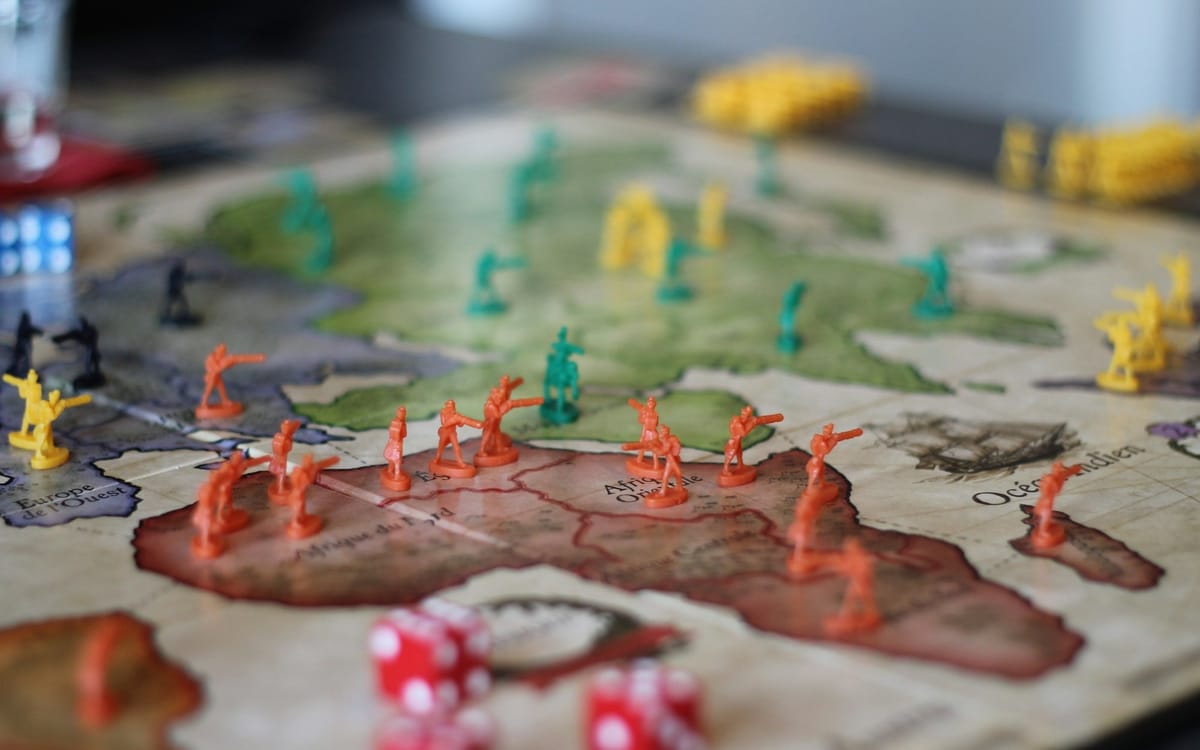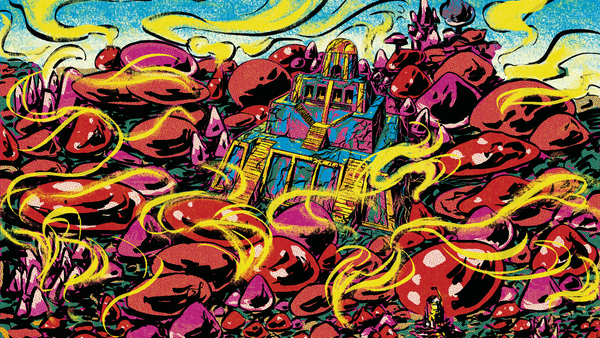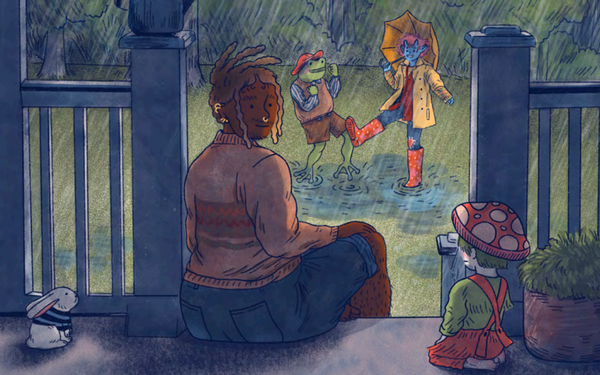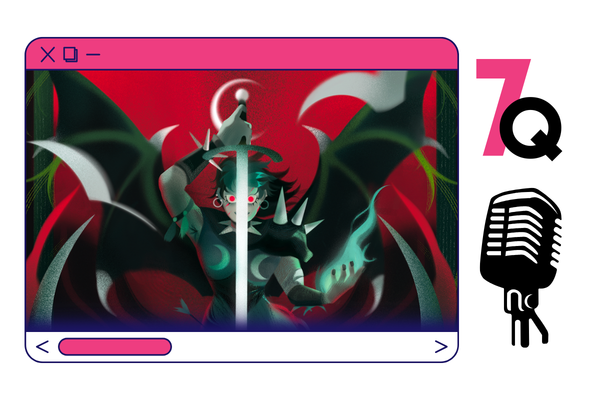The history of RPGs, one hour at a time
Anna Anthropy talks about the laborious but rewarding process of condensing historically important RPGs into classroom sessions.

Acclaimed game developer Anna Anthropy, who’s behind deeply introspective games like Dys4ia and Queers in Love at the End of the World, has taken on a mammoth task: to condense some of the most consequential tabletop RPGs into brief, hour-long experiences. This was done for a series of classes she conducted at DePaul University on the History and Design of RPGs between 2020 to 2025. Back then, the curriculum consisted of highlighting specific aspects of these monumental games in hour-and-a-half sessions, so her students could best experience the games’ dynamics and texture. Some of these RPGs, however, were massive: think the days-long play of Diplomacy, or the lengthy books and packets of AD&D: Tomb of Horrors, only reshaped into bite-sized, digestible sessions.
Anthropy has included on itch.io in-depth notes on how she ran these games in class, and these are incredibly fascinating reads; Apocalypse World, for instance, was notable for being part of the burgeoning movement towards self-publishing RPGs back in 2010. This, in turn, has resulted in Apocalypse World becoming a RPG that’s “more narrative in approach” than of Dungeons & Dragons. We were curious to learn more, and fortunately, she was able to take some time out to answer a few questions about this huge undertaking.
This interview has been edited slightly for clarity.
Khee Hoon Chan: Can you share a little about what your class on the History and Design of Tabletop RPGs is about? What do you want your students to take away from the class?
Anna Anthropy: The class is actually "History and Design of RPGs," which is why it was doubly important to come up with manageably-sized versions of these games: We were splitting our time between playing historical games and exploring fundamental design concepts, like narratively-charged resolution mechanics. We started out doing design on Mondays, history on Wednesdays, and the hope was that the two halves of the class would support each other. Like that Advanced Dungeons & Dragons (AD&D) would be interesting to play alongside the topic of dice mechanics, and Apocalypse World alongside exploring how narrative authority is divided in games.
Chan: How do you choose which TTRPGs to feature in your class?
Anthropy: I wanted to choose games that represented big paradigmatic swings in TTRPG history and provided a lot of runway to talk about the historical context in which they were developed. Diplomacy, AD&D, Apocalypse World and We Are But Worms all represent big shifts in what role-playing is, but each of them can also tell us a lot about who is making role-playing games and that moment and how. It's hard to talk about Apocalypse World without talking about the Forge forums and how indie RPGs changed the field, for example. No games exist in a vacuum, but these games especially have a lot to tell us about the player-author community surrounding them.

Chan: How do you condense these games into bite-sized versions? Is it a tedious process?
Anthropy: The most ambitious and most tedious of the games was AD&D: Tomb of Horrors: I compiled materials from at least five different AD&D publications into something that had to be doable in an hour-and-a-half but would still feel like an overwhelming amount of reference material, to serve the exercise. It's frankly amazing that I managed it. I already knew by that point that I had been laid off from my job, but I was committed to giving my students a really memorable final class before I left. The other games were a lot more manageable.
Chan: Can you share your process, or some examples of game features you prioritize keeping or removing for your lecture?
Anthropy: It was important to me to preserve some sort of the goal structure from each of the games, to give students a little nudge as to how to play them. The reduced Diplomacy map, for example, still had supply depots to fight over. I gave my students pregenerated characters for Apocalypse World, but I filled out two highlighted stats for each—one that the character was good at, one that they were weak at—and told them to try and hit their highlights, just like you would in a real session. In AD&D, I gave each group graph paper and told them to try and physically map as much of the dungeon as possible.
Chan: In your post for We Are But Worms, you suggested that the game is a product of itch.io as a platform, and talked about the demise of Google+. What are your thoughts on the role of platforms in furthering and evolving TTRPGs as a medium?
Anthropy: I think [the] means of distribution has a huge material effect on what kinds of games can be made and why. If you're limited to doing huge, expensive print runs that have to sell big to make a profit, you can really only make "blockbuster" big book games like D&D. The development of print-on-demand technology like lulu.com and digital distribution of pdfs was really instrumental in making smaller TTRPGs with a more specific scope possible. "Story games" wouldn't have really happened without self-publishing, "lyric games" wouldn't have happened without a free platform like itch.io.
"I wanted to choose games that represented big paradigmatic swings in TTRPG history and provided a lot of runway to talk about the historical context in which they were developed."
Chan: How’s the reception to your lecture so far?
Anthropy: I mean, my students loved it. They seemed to have had a blast, and the games fostered some really good discussions. One of my students was really blown away by lyric games and immediately made a very specific game about listening to music that read almost as a kind of guided meditation. I've run the class for years, to be clear, but this final time was the one I finally said "fuck it" and and threw myself into running really difficult historical games in the class. I'm just sad I won't be able to run the class again for a while.
Chan: Do you know of any other lecturers who have used your materials to conduct similar lectures?
Anthropy: Well, they've only been online for a couple weeks. So I haven't heard any stories yet. But if someone ended up using them in their classrooms, I would love to hear about it!
Chan: What other aspects of TTRPGs would you love—or have plans—to conduct a lecture on?
Anthropy: It'd be fun to do a workshop on unusual game mechanics. I've done exercises around them in my RPG class, using Sharang Biswas' Feast as a central example. In the right context—probably not an undergraduate class!—it'd be fun to discuss the nascent Faggot Games movement (named and articulated by Darling Demon Eclipse) that has sort of grown out of the lyric games movement. I'd love to lecture on early CRPGs and the way they existed, like AD&D, as a hybrid of multiple different pieces of media (in their case, digital software and print books, "feelies", and maps).
Chan: Do you have anything else you would like to share?
Anthropy: I mentioned I'd been laid off from my university job teaching game design, but I'm going to be teaching a four-week workshop on interactive fiction starting at the end of September. It's remote, so anyone can sign up, which is a great opportunity for anyone who's wanted to take one of my classes. And of course my Princess with a Cursed Sword games are coming to Kickstarter next month as part of Tim Hutchings' Art & System series, along with Liam Liwanag Burke's Dog Eat Dog and Tim Kleinert's The Mountain Witch. I'm excited about it!





